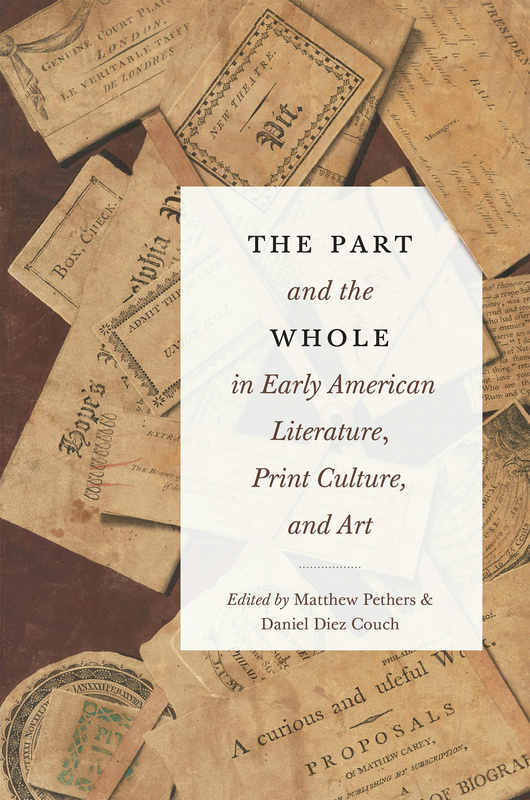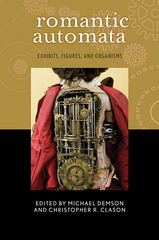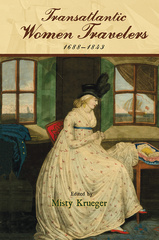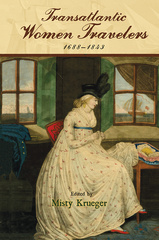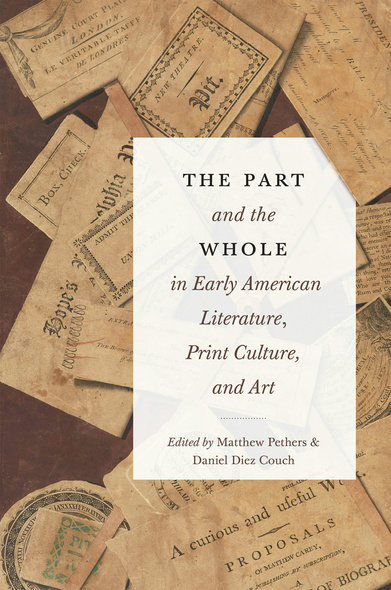
The Part and the Whole in Early American Literature, Print Culture, and Art
The essays in this pathbreaking collection consider the significance of varied early American fragmentary genres and practices—from diaries and poetry, to almanacs and commonplace books, to sermons and lists, to Indigenous ruins and other material shards and fragments—often overlooked by critics in a scholarly privileging of the “whole.” Contributors from literary studies, book history, and visual culture discuss a host of canonical and non-canonical figures, from Edward Taylor and Washington Irving to Mary Rowlandson and Sarah Kemble Knight, offering insight into the many intellectual, ideological, and material variations of “form” that populated the early American cultural landscape. As these essays reveal, the casting of the fragmentary as aesthetically eccentric or incomplete was a way of reckoning with concerns about the related fragmentation of nation, society, and self. For a contemporary audience, they offer new ways to think about the inevitable gaps and absences in our cultural and historical archive.
Professional, well edited, and innovative. . . . The collection creates necessary space for the careful examination of passed-over or ignored, but important, literary and visual art. Recommended.
Brilliantly shows that respecting the plural, disjunctive, and fragmentary character of much early American writing makes marginalized genres interesting, and permits us to read women, minority writers, and history itself in exciting new ways. Highly recommended!
This book bristles with new claims, local insights, and a bona fide enthusiasm of renovation. Its conceptual interventions and its roving, voracious engagement with all kinds of cultural objects will make it a touchstone in the field. I imagine colleagues buying the book, using it in their writing and teaching, and repeatedly skipping and skimming their way through the essays with pleasure.
This excellent collection offers a compelling new view of literary textuality in early America. . . . The pieces are well written and reader-friendly. I found myself carried along, learning a great deal about texts and authors that I have long studied and others that I have hardly known. Strong from beginning to end.
DANIEL DIEZ COUCH is an associate professor of English at the United States Air Force Academy in Colorado, where he teaches eighteenth- and nineteenth-century American literature. He is the author of American Fragments: The Political Aesthetic of Unfinished Forms in the Early Republic.
Matthew Pethers and Daniel Diez Couch
Part I – Partial Histories
Chapter 1: Reading for Unreadability; or, Embracing the Gaps in Congregational Church Records
Lori Rogers-Stokes
Chapter 2: Textural Scholarship: Susan Howe’s Mary Rowlandson
Marion Rust
Chapter 3: ‘Composing my resentments’: Process and Palimpsest in Sarah Kemble Knight’s The Journal of Madam Knight
Nicholas K. Mohlmann
Chapter 4: Fragments, Scraps, and the Formalism of the Historical Imagination
Daniel Diez Couch
Part II – Fragmentary Communities
Chapter 5: Reading Early American Almanacs: Imagining Unity in Parts and Pieces
Keri Holt
Chapter 6: Lists and List-Makers of the African Atlantic Archive
John Saillant
Chapter 7: Failed Periodicals, Forgotten Satires, and Alternative Forms of Dissent in Antebellum America
D. Berton Emerson
Part III – Visible Assemblages
Chapter 8: The Early National Picturesque
Laurel Hankins
Chapter 9: Visualizing the Incompleteness of ‘Mound-Builder’ Ruins
Lisa West
Chapter 10: Edward Taylor and the Art of Assemblage
Amy Morris
Notes on Contributors
Index

